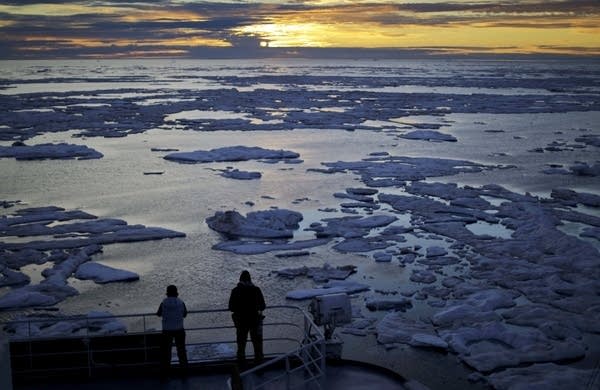Climate Cast: How to be a climate hero

Go Deeper.
Create an account or log in to save stories.
Like this?
Thanks for liking this story! We have added it to a list of your favorite stories.
MPR chief meteorologist Paul Huttner hosted an hour-long edition of Climate Cast on Wednesday. Here's what we talked about:
In the News: Climate of fear
Americans are increasingly alarmed about climate change. Huttner discusses recent polling that shows a dramatic change in public opinion about climate change.
Turn Up Your Support
MPR News helps you turn down the noise and build shared understanding. Turn up your support for this public resource and keep trusted journalism accessible to all.
Guests:
• John Kotcher of George Washington University's Center for Climate Change Communication.
• Bernadette Woods Placky, director of Climate Central's "Climate Matters" program.
In-depth: How to be a climate hero
Does individual action on climate change really make a difference? NASA climate scientist Peter Kalmus believes it does, and so he wrote a book about it. In "Being the Change: Live Well and Spark a Climate Revolution," he describes his journey which led to reducing his carbon footprint to one-tenth of the average American's.
Huttner spoke with Kalmus and Jessica Hellmann, ecologist and director at the University of Minnesota Institute on the Environment, about what we can do individually and collectively to slow the trajectory of climate change.
Guests:
• Peter Kalmus, NASA climate scientist and author "Being the Change: Live Well and Spark a Climate Revolution."
• Jessica Hellmann, director for the University of Minnesota Institute on the Environment.
Also featured this hour: A changing world
Paul Huttner's tour of the University of Minnesota Bell Museum's "Weather to Climate: Our Changing World" exhibit.
To listen to the entire show, click the audio player above.
From Twitter: People fighting climate change in their daily lives
We downsized from a single family home to a townhouse, cutting our heating to 30% of the prior cost; moved closer to work to cut gasoline use; added bicycle commuting to cut gasoline further; drive only smaller fuel efficient vehicles.
— Marty Cormack (@martycormack) March 6, 2019
I've been a vegetarian for 5 years, bought a smaller car, work from home 1x a week, and one you're not talking about: retail consumption. thrift stores & buying used online saves $ and carbon footprint.
— EXPLOITED BY COYOTES (@Cooperisherenow) March 6, 2019
I rarely travel, preferring a local lifestyle. I avoid long drives and flights when possible, since there is so much to enjoy right here in the upper Midwest. Why is there such a high value placed on travel when it is so bad for the environment?
— Dale Wyte (@DaleWyte) March 6, 2019
I eat a veggie burger roughly every 3rd visit to a restaurant. Reduce meat consumption 33% but realistic to my preferred diet.
I bought old house, centrally located. Didn't want to drive far or use newly converted countryside.— Rob Roberts (@studio_robo) March 6, 2019
I'm vegan. I also turn down the heat/air, use natural light when possible, recycle, yadda yadda yadda. But being vegan is the number one way I'm combatting climate change
— Michael Zarling (@MNtwinsGBR) March 6, 2019
@nateoftheunion and I use solar power to fuel our Duluth home and Nissan Leaf. We also vote for those who believe in science!
— NormanSandiego (@normansandiego) March 6, 2019
Our family practices multi-modal transportation. Yes, we drive, but we also bus, bike, and walk.
— Lukas Brandon (@LukasBrandon) March 6, 2019
Yup, moved to within 2 mi of work and bike to work, planted trees for passive cooling, reduced meat consumption, reuse then recycle everything, compost all our organic waste. Purchase only that which is necessary. All of which is easy and free...( except the move)
— Jcott (@jacottrell51) March 6, 2019
We recycle all we can, keep the heat down at home (if it's chilly, put on a sweater), combine trips to conserve gas, garden organically, compost & use yard wastes to keep them out of landfills..
— Rabbi Yonassan Gershom - Autistic Stable Genius (@rooster613) March 6, 2019


